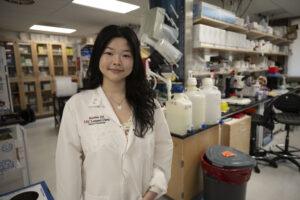 I’m graduating this year with a master of science degree in gerontology from the USC Leonard Davis School. As I reflect on my time in the department, I am filled with gratitude for the professors who positively influenced my collegiate experience and extended their support in academic mentorship and collaboration.
I’m graduating this year with a master of science degree in gerontology from the USC Leonard Davis School. As I reflect on my time in the department, I am filled with gratitude for the professors who positively influenced my collegiate experience and extended their support in academic mentorship and collaboration.
At the end of last year, I had an opportunity to nominate Dr. Jon Pynoos for induction into the USC Golden Key Chapter. I knew he would be an excellent candidate for this international honor society, which is dedicated to personal, professional and altruistic achievement.
Dr. Pynoos was my first professor at the USC Leonard Davis School of Gerontology. His “Policy, Values and Power in an Aging Society” class laid the foundation for my interdisciplinary and intergenerational coursework and inquisitive investigation of the field. I will never forget how formative our class discussions were, as we explored landmark legislation like Medicare, Medicaid and Social Security as well as the social contracts between generations.
Dr. Pynoos always encouraged us to think for ourselves and to critically analyze existing aging frameworks while imagining novel and innovative ones. I remain grateful for his wisdom and kindness, and I credit him with helping launch me on a successful USC academic career.
I was thrilled when he was chosen as a Golden Key Honorary member, and proud to help celebrate him and his world-changing work at the New Member Recognition ceremony. Dr. Pynoos’s dedication to thoughtful evidence-based research, visionary leadership and compassionate mentoring has inspired countless students. It was meaningful to see him rewarded and recognized.
As I graduate from the USC Leonard Davis School of Gerontology this May 2013, I look forward to the challenges and opportunities that lay ahead of me. I hope to follow in the footsteps of Dr. Pynoos by emulating his kindness, generosity and sincerity. I want to inspire others as he has inspired and empowered me, and to make a positive difference in the world and our interdisciplinary field.
Because of his exemplary mentorship, dedication, and passion for autonomy and quality of life, I believe my fellow graduates and I can cultivate a culturally sensitive, personalized and collaborative model of care and support for the future. I am humbled to continue my academic and professional journey and carry with me the eloquent, rigorous and supportive direction of Dr. Pynoos.
Thank you, Dr. Pynoos, and all of the USC Leonard Davis School. Fight On!









